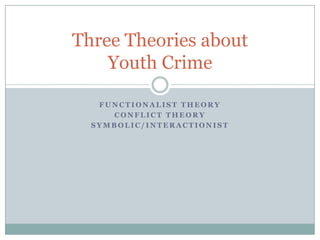Three Theories About
•Als PPTX, PDF herunterladen•
1 gefällt mir•3,167 views
Melden
Teilen
Melden
Teilen

Empfohlen
Weitere ähnliche Inhalte
Was ist angesagt?
Was ist angesagt? (19)
Conflictandfunctionalisttheory 101015102833-phpapp01

Conflictandfunctionalisttheory 101015102833-phpapp01
Ähnlich wie Three Theories About
Ähnlich wie Three Theories About (20)
SOCIOLOGICAL THEORY -Read the following guide to the three cen.docx

SOCIOLOGICAL THEORY -Read the following guide to the three cen.docx
3rd lecture- Sociological perspectives and their applications on health 2020

3rd lecture- Sociological perspectives and their applications on health 2020
Chapter 4Social Structure and Process TheoriesSocial

Chapter 4Social Structure and Process TheoriesSocial
Choose one of the following questions1. Compare and contra.docx

Choose one of the following questions1. Compare and contra.docx
SEQ CHAPTER h r 1Talcott Parsons (1902-1979)Parsons w.docx

SEQ CHAPTER h r 1Talcott Parsons (1902-1979)Parsons w.docx
Discussion Individual vs. Structural-Cultural TheoriesTheor

Discussion Individual vs. Structural-Cultural TheoriesTheor
What is SociologyThe scientific study of human – social activ.docx

What is SociologyThe scientific study of human – social activ.docx
Introduction to the Social Dimensions of Education : Consensus and Conflict T...

Introduction to the Social Dimensions of Education : Consensus and Conflict T...
Mehr von Daryl Bambic
Mehr von Daryl Bambic (20)
Kürzlich hochgeladen
Kürzlich hochgeladen (20)
Asian American Pacific Islander Month DDSD 2024.pptx

Asian American Pacific Islander Month DDSD 2024.pptx
Z Score,T Score, Percential Rank and Box Plot Graph

Z Score,T Score, Percential Rank and Box Plot Graph
Micro-Scholarship, What it is, How can it help me.pdf

Micro-Scholarship, What it is, How can it help me.pdf
ICT role in 21st century education and it's challenges.

ICT role in 21st century education and it's challenges.
Seal of Good Local Governance (SGLG) 2024Final.pptx

Seal of Good Local Governance (SGLG) 2024Final.pptx
Unit-IV; Professional Sales Representative (PSR).pptx

Unit-IV; Professional Sales Representative (PSR).pptx
Presentation by Andreas Schleicher Tackling the School Absenteeism Crisis 30 ...

Presentation by Andreas Schleicher Tackling the School Absenteeism Crisis 30 ...
Python Notes for mca i year students osmania university.docx

Python Notes for mca i year students osmania university.docx
Mixin Classes in Odoo 17 How to Extend Models Using Mixin Classes

Mixin Classes in Odoo 17 How to Extend Models Using Mixin Classes
Measures of Central Tendency: Mean, Median and Mode

Measures of Central Tendency: Mean, Median and Mode
Energy Resources. ( B. Pharmacy, 1st Year, Sem-II) Natural Resources

Energy Resources. ( B. Pharmacy, 1st Year, Sem-II) Natural Resources
Three Theories About
- 1. Functionalist theory Conflict theory Symbolic/interactionist Three Theories aboutYouth Crime
- 2. Conflict Theory Understands social groups by examining the underlying conflict Sociologists want to understand the power struggles between the groups What causes it? Assumption #1: society is composed of a variety of groups in conflict with each other and each group seeks to impose its own standards/rights/power/norms etc Assumption #2: these norms/values are not shared
- 3. Consequences of conflict Because these norms/values are not shared, one group seeks to dominate the others and seeks to improve its standing at the expense of the other. What examples can you think of? If one group dominates, there will be peace and stability but this is imposed by force (or threat) to maintain this state.
- 4. Functionalist theory Society is a system of many different parts (groups) that function together to achieve equilibrium/harmony/stability/ Sometimes called the status quo Think of your body where all organs must work together for a maximal state of health When these systems (groups, institutions) work well, there is equilibrium When they don’t there is strain and disharmony
- 5. Consequences of strain When the parts (systems) of the society are under strain (sometimes because of change), the goals of that society (think values) are not internalized by the individual. Example: Canada, Quebec, Education Act, drop out rate, unemployment problems… Example: Low voter participation rates What are the values/goals that the ‘system’/society has that the individual is not internalizing?
- 6. Evolution Social systems evolve VERY SLOWLY and so change takes time Functionalist theory focuses more on order and status quo than on change Functionalist theory focuses on institutions that promote stability (education, churches, temples, government)
- 7. Agreement? Both agree that shared values between groups are essential for a society’s health CONFLICT: These values are forced FUNCTIONALIST: These values must be learned Example: families, parents, children = mini societies Youth crime: an example of resistance to values they perceive as ‘forced’ upon them Rejection of mainstream values by the powerless and the minorities
- 8. Explaining Crime Conflict theory Youth crime: an example of resistance to values they perceive as ‘forced’ upon them Rejection of mainstream values by the powerless and the minorities Functionalist theory Values are poorly learned, youth + dysfunctional homes, poverty, mental illness, inadequate schools all contribute to creating this problem
- 9. Causes of CrimeConflictFunctionalist Delinquency is a reaction of the life condition of a person’s social class People act in ways that suit their social position and power/powerlessness We are a product of our class What are the elements that make up someone’s class? Delinquency is a result of individuals/groups not internalizing the shared values/norms/rules of their society. Some absorb delinquent values.
- 10. ConflictFunctionalist Youth crime is concentrated in lower classes because the ruling class sees their behaviour as delinquent More likely to be arrested because the ruling class has the power to do this and controls the police Youth crime is concentrated in the poor because the institutions that are supposed to help are not effective and are dysfunctional (families, schools, peers, neighbourhoods) More likely to be arrested because they commit more crimes
- 11. ConflictFunctionalist Delinquency varies from society to society depending upon the political and economic structures of that society Socialist societies have less crime because they have less social/class conflict Delinquency is a constant feature in all societies Capitalist and socialist both have the same rates of delinquency
